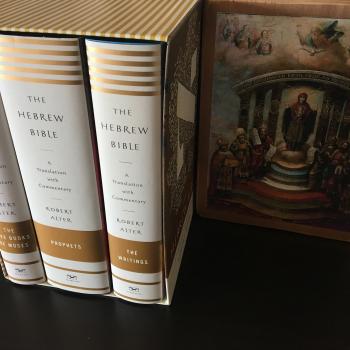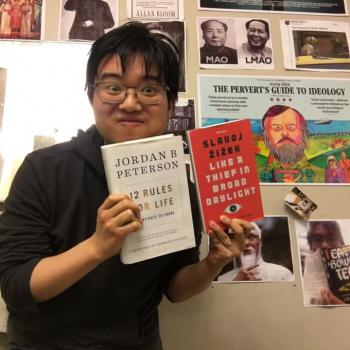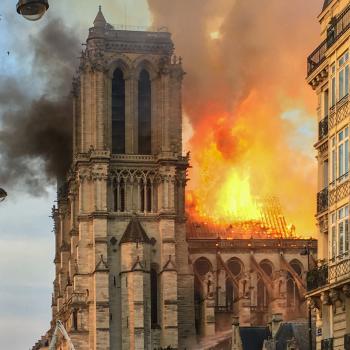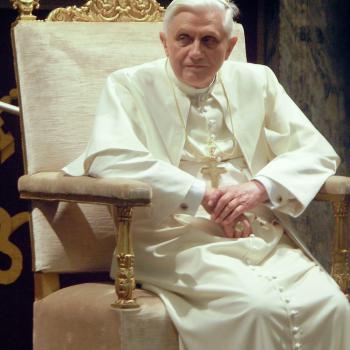I deeply appreciate how the conversation among Douglas Todd, the St. Peter’s Fireside staff, and I have been shaping each other’s discourse. As I said in yesterday’s post, these posts are not only for the theological entertainment of a niche group of readers. They are public deliberations, put on the public record, in a public sphere that has one of its major items of debate what the place and privilege of Christians is in our society. That we can model public theological conversation and debate is a joy that we should not take lightly. For all we know, it could reposition the monolithic image of a Christian Right nefariously trying to take over a secular public sphere into a diffuse kaleidoscope of moderate Christians working out in very public ways the ways that they disagree yet remain in loving communion.
It’s in that spirit that I want to remark on how remarkable Mike Chase must be as a pastor. The post that he has delivered as a response to Douglas Todd on how ‘classical Christians’ understand divine sovereignty and human suffering is classically pastoral in the sense as it provides guidance for the people of God in Jesus Christ to develop a fuller life participating in his life. Here’s what Todd said:
When bad things happen, atheists sometimes turn to Christians and rhetorically demand: “So where is your God now?” The question hinges on the incorrect assumption that progressive Christians believe God controls everything, like a supernatural dictator. Liberal Christians tend to believe life is a combination of chance and divine purpose. Given they have free will, humans can engage in moral evil, whether they’re Hitler, members of Boko Haram or wanton polluters. In a creativity-filled universe, chance also makes it possible for bad things to happen in nature, like a destructive avalanche. Liberal Christians believe that, out of suffering, God works to bring new order and healing.
What’s interesting about Todd’s account of liberal Christianity is that it has plenty of room for a ‘classical’ Christian understanding of divine sovereignty and human agency, as it should, particularly because ‘liberalism’ in one sense shouldn’t mean much more than the development of an overlapping consensus among disparate socio-theological imaginaries. Chase correctly sees his ‘in,’ pointing out that his view and Todd’s overlap quite a bit, both in an understanding of God’s sovereignty and human suffering. Disavowing the ‘Calvinism stricter than Calvin’ that plagues contemporary theological discourse among evangelicals in which some have emphasized divine sovereignty at the complete expense of human agency, Chase observes that a ‘classically Christian’ understanding of God’s relationship to the world has a lot of room for human response and responsibility (although I really wish that, as in the previous post on race, Chase would add a bit of a qualifier in his quote from St. Augustine about Jewish-Christian relations). While some may read Chase’s insistence that ‘God controls everything’ as a mere assertion without argument, it sounds to me like Chase is sufficiently aware of Yale theologian Kathryn Tanner’s God and Creation in Christian Theology because Chase chalks up the disconnection between divine sovereignty and human agency to a modern metaphysics. For Tanner — and thus, for Chase — there were different metaphysical rules governing the ‘classical’ conceptions of divine sovereignty, especially in the quotes Chase selects from St. Clement of Rome, and while a nominalist account of God’s sovereignty that argues that God can basically do whatever he wants has presented modern theologians with an ‘either/or’ of divine sovereignty or creaturely agency, the older Christian ‘grammar’ of God as a divine agent working in the world sees no need for this dichotomy.
In turn, Chase argues that this means that there is no need to engage in debates about God’s sovereignty when it comes to human suffering. Instead, a pastoral response would be that human suffering, like the example of St. John Paul II slowly deteriorating and showing the world how a Christian dies well, is a participation in the crucified suffering of Christ. In this way, classical Christians don’t engage in intellectual gymnastics when they encounter human suffering. They enter into the ‘suffering of the other and point them to Christ,’ suggesting that, plainly speaking, we’re all in this together.
Chase’s pastoral response reminds me of some time that I spent with some priests associated with the Congregation of Holy Cross. I had gone through a very difficult season of ministry — yes, before this academic thing and indeed, before even this Thing, I was discerning a call to pastoral ministry — and had gone to live with the priests to refuel. Much of it was spent with good food — candied kielbasa, slow-cooked chicken thighs, Sunday night pizza and movie — and great table conversation in which the priests often exchanged collegial jabs at each other to hilarious effect. One moment that I will never forget, though, was during one of the daily morning masses. The celebrating priest that morning had to preach from the Gospel passage where Jesus tells off the Sadducees for their hypothetical situation about the woman marrying seven brothers and being confused about her real husband at the resurrection. Going beyond criticizing the Temple establishment for not believing in the resurrection, this priest argued that the real problem was that they didn’t understand that God had come close to them and was living and working among them in powerful ways. He then ended the homily with a prayer to ‘Christ Our Brother.’
Christ Our Brother. I understood that theologically; after all, St. Paul has himself written of Christ as the firstborn of all who share in the risen life and of Christians as ‘co-heirs with Christ.’ But this priest actually believed it. I remember asking him about it later, and he just said matter-of-factly, ‘You know, I think a lot of Christians want to think of God as very distant from them. But I’m afraid that’s not Christianity. As a Christian, you don’t believe that God is distant. God is close to us, and we’re afraid of that.’
Years ago, this same priest had introduced me to the work of Hans Urs von Balthasar, and when he heard that I was still interested, he asked, ‘Have you read Mysterium Paschale? It’s Balthasar’s most accessible work.’
I’m sure that Mysterium Paschale is hyped up to be ‘accessible,’ but that book took me a whole year to read. That’s because von Balthasar completely messed with me. Most will talk about von Balthasar’s development of the ‘hiatus’ on Holy Saturday, the day between Good Friday and Easter where God is really dead. But what struck me was a formulation in the first chapter where von Balthasar contextualizes his understanding of that pause with the kenosis, the self-emptying of God in Jesus Christ. For von Balthasar, God’s action in emptying himself in Jesus Christ is the supremely sovereign act that shows that divine sovereignty is fully expressed in being completely helpless as a human being who is completely obedient to the Father, freely accepting even death, death on a cross. To put it in all of its radical glory, God exercises his sovereignty by falling into the hiatus of Holy Saturday.
In this sense, there is really no need for Chase to separate the two parts of his post between the ‘theological’ and the ‘pastoral.’ If God’s expression of sovereignty is not that God can do whatever he wants (as the nominalists assert) but to love us so much as to fall into the abyss with us, then a ‘classically Christian’ theology is that Christ our brother suffers with us — that is simply who God is as a divine agent. In turn, it is an unclassical thing — indeed, a modern nominalist thing — to start with ‘God’ as an empty, characterless category with a terrifying, arbitrary sovereignty who can do whatever he wants and does nothing to stop the evil in the world, which means that it’s also an unclassically Christian thing to assume that God’s real job in exercising his sovereignty is to stop the evil in the world. No, in this sense, both Todd and Chase would affirm a suffering God, one who acts by coming close to us, even down to hell, to bring us back to life.
That’s why our resident expert on suffering here on A Christian Thing, Churl, writes so publicly about his mental illness and his recent conversion to Roman Catholicism. When I read Churl’s posts, the raw honesty always stuns me into silence. I suppose that’s the point. See, Churl is also a scholar who knows Job and Ecclesiastes like the back of his hand. When he is that honest in public, it’s like he’s putting up a finger, warning us that even ‘pointing to Christ’ cheapens his suffering. Don’t be Job’s comforters, he is saying, just don’t say anything. Or, in the words of James Wellman, a ‘liberal’ Christian who says too many ‘classically Christian’ things, ‘grief is underrated,‘ a feeling that he knows intimately in the wake of his wife’s death and his very public mourning over the loss of his ‘home’ with her. If God himself can fall into the silence of the abyss, we should, to take Ecclesiastes’s Qoholet out of context, let our words be few. If we really believe that God is near and that Jesus is present as a brother to the suffering, then there’s no need for us to say anything. The ‘classical Christian’ practice of the ‘theological’ and the ‘pastoral’ in the face of suffering may well be silence. After all, when Christ our brother is present but silent, what right have we speak?
And because that’s a perfect segue into the next post on death and the beyond, I’ll stop here and wait for Roger Revell’s response to Todd’s account of the resurrection.











